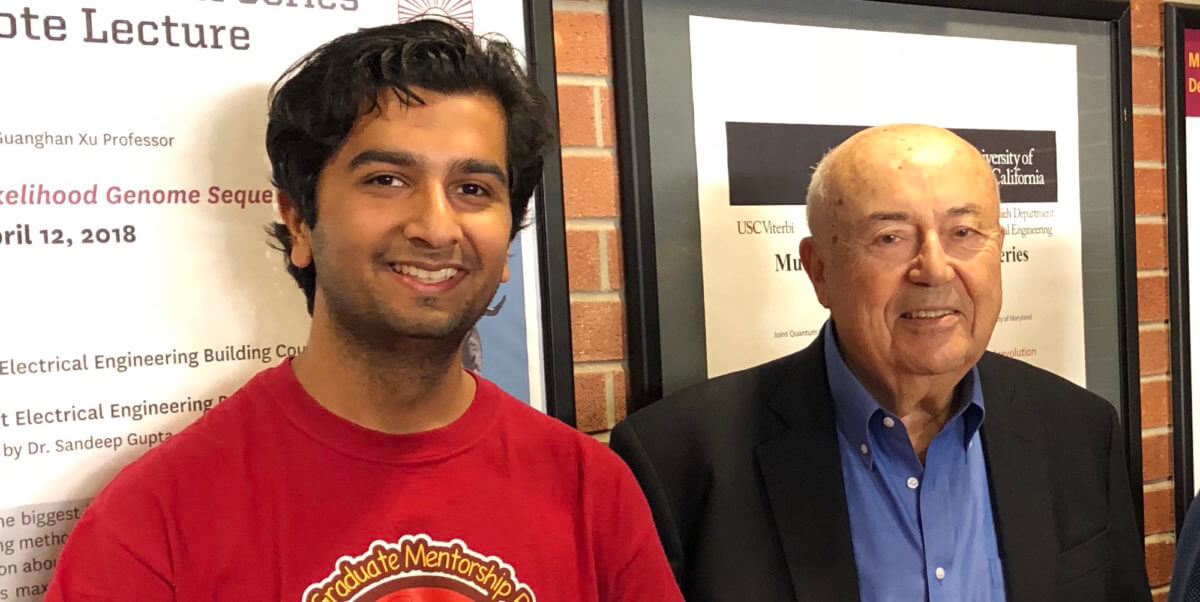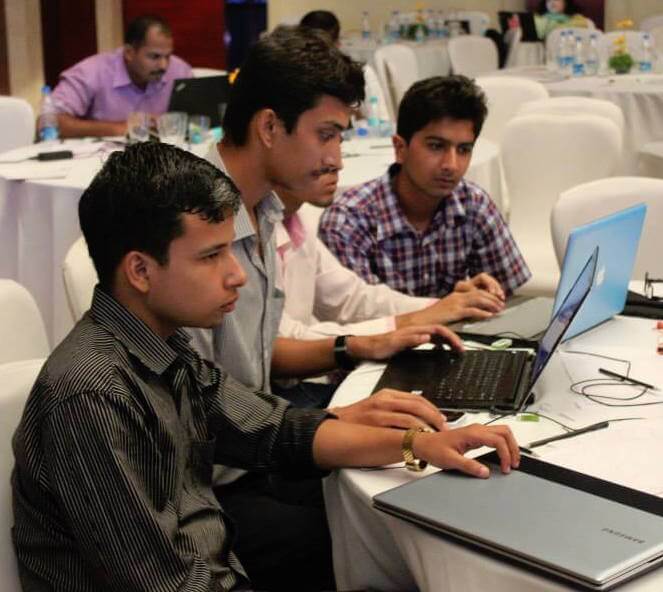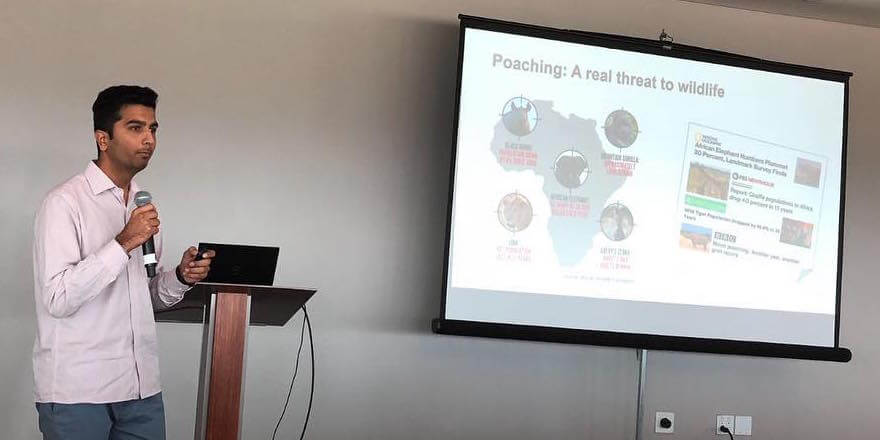
Graduate student Laksh Matai (left) with Dr. Andrew Viterbi at the annual Viterbi Lecture Series. PHOTO CREDIT: USC Viterbi
By Laksh Matai
Two years ago, as a humble undergraduate student in Western India, I never imagined that I would one day be at USC shaking hands with Andrew Viterbi, the inventor of the Viterbi algorithm, founder of Qualcomm, and the namesake of the USC engineering school. Dr. Viterbi was one of the first people to be awarded a PhD in Electrical Engineering from USC and I was just a first year Masters student in the same field. How did I get so lucky?
You may already know that in India, many students feel pressure from family and society to go into engineering. But for me, computers were everything I loved about engineering: The power to create something and to solve a problem with that creation. I was introduced to Mobile Application Development in college and I fell in love with it. I have always loved animals too, and my first app was designed to help kids connect with nature. It taught them facts about animals and I named it “Zoo Trip.”
One of my first classes as an undergrad in India was on information theory. It was here that I first learned about the Viterbi algorithm. Although I benefit from this algorithm every day, I had never heard of it before. I was amazed to find out just how much of modern communication relies on this one amazing breakthrough. It was then that I realized the impact engineers can really have in changing the world.
And then, before I even knew it, I had graduated from college and did what most young Indian students are expected to do – I got a job.
For a year I worked as a web developer. I learned a lot and I was comfortable. And yet, I found myself constantly thinking back to my time in school. More specifically, I found myself thinking about the Viterbi Algorithm. How could one seemingly simple line of math change the entire world? How could I learn more??
"I had always thought the most impressive thing about Dr. Viterbi was his algorithm, but actually, it’s the amazing place he has helped build here."
At that moment I understood that I needed to go back to school for a graduate degree. After months of applications, stress, and paperwork, I found myself at my dream destination – USC. That’s right, I would be going to the very same school where Dr. Viterbi earned his PhD.
I still remember first arriving in Los Angeles, and how excited I was. Although I had just spent 21 hours traveling across the globe, I was only in my room long enough to set down my bags before jumping out to take the USC tour with other new students from around the world. I visited the Lyon center and saw the USC football team practice. Later, I ate dinner in downtown Los Angeles and had the famous black ice cream at Little Damage. My first day in Los Angeles filled me with confidence and good memories for many more days to come.
One day in class my teacher, Professor Rajati, shared his experience meeting Dr. Viterbi and I was completely awestruck. For many young electrical engineers, Andrew Viterbi is something like a rock star. It hadn’t dawned on me that someone I knew might have actually met him before!
Dr. Rajati told me about the Electrical Engineering department’s flagship event, the Viterbi Lecture. He said that if I came, there was a chance I might be able to meet Dr. Viterbi in person. I was so excited that I came an hour early and waited awkwardly in the hallway. I met with Dr. Viterbi before the event and got a chance to introduce myself and take a photo with him in person. Although he had traveled from another city and was surrounded by many esteemed colleagues and old friends, Dr. Viterbi took the time to speak with me, a simple graduate student. He listened intently and let me tell him about myself. I will never forget how kind and humble he was towards me.

Laksh (right) as an undergrad at a Microsoft UX design workshop at the University of Pune in western India. PHOTO CREDIT: Laksh Matai
My time here at USC has made me appreciate other things as well. I joined a research lab named the Center for Artificial Intelligence in Society under Prof. Milind Tambe. I’ve been working here full time for the summer and I’m fortunate to be surrounded by such brilliant minds. The work in the lab matches my philosophy of solving problems in the world. I’ve been working on a project in which we help conserve wildlife by predicting poaching activities. Working on this project, I’m reminded of the first app I built as an undergraduate student to educate students about animals.
The PhDs and post-docs have actually motivated me to consider pursuing a Ph.D. and involve myself even more in research. Along with the other students, I presented my project in front of USC faculty and people from Microsoft AI for Earth and Los Angeles Homeless Service Authority. This presentation gave me a glimpse of what my future as a Ph.D. student could look like. I would encourage more graduate and even undergraduate students to get involved in research as well, so they can see this side of engineering.
Today, I’m getting ready to start my second semester in the Data Informatics Master’s Program. The thing that has surprised me the most hasn’t been the technical knowledge I’ve gained (though of course that has been great!). Instead, it’s been how much my mind has been opened to new possibilities and exposed to a community full of support and ideas I never would have imagined. I had always thought the most impressive thing about Dr. Viterbi was his algorithm, but actually, it’s the amazing place he has helped build here.
Laksh Matai is a second-year graduate student in the Data Informatics program. He also is a member of the Center for Artificial Intelligence in Society (CAIS) where he conducts research to help combat animal poaching in Africa.

Laksh, with his work at CAIS's Summer Fellows Final Presentation event. PHOTO CREDIT: Laksh Matai
Published on August 27th, 2018
Last updated on April 6th, 2021


